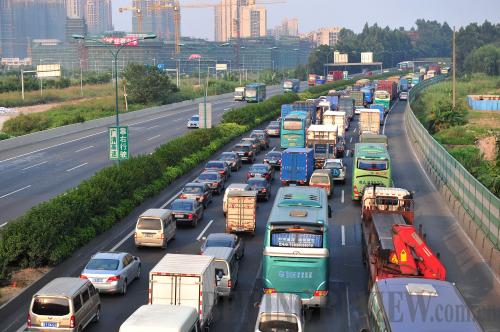|
 |
|
CONGESTION: Traffic jam on the expressway out of Guangzhou City in Guangdong Province on October 7 (LU HANXIN) |
Han revealed that he works overtime during the weekdays and the "legal holidays" are the only time he can have a break. "Long or short, it is better than nothing," Han said.
In February, the State Council announced plans to build a paid annual leave system, planning to have it implemented by 2020. Both the program and the Tourism Law, which took effect on October 1, emphasize the importance of tourism and leisure welfare for citizens.
"Currently, those working for government organizations and state-owned enterprises are more likely to take paid vacations. Those of us working for labor-intensive and private firms rarely have the chance," Han said, adding that the Labor Law stipulates only five days of annual paid leave for employees working less than five years at a place of employment.
"Even if the employers allow us to take vacations, we are at risk of losing promotion opportunities due to fierce competition," Han said.
"Creating a holiday system that can satisfy everyone is unlikely," said Wang Chenguang, a professor of tourism management at Shandong University.
Wang believes the problem is more about the quality of the holidays than the quantity. "People don't have many choices when traveling, which causes overcrowding and traffic jams at scenic spots."
Figures from the China National Tourism Administration show that during October 1-7, Chinese tourists made 428 million domestic trips, an increase of 15.1 percent year on year.
The 125 major scenic areas covered by the national tourism forecast system received 31.25 million visitors during the holiday.
The huge number of travelers has put a heavy burden on the country's road and rail traffic, scenic spots, and dining and lodging facilities.
In one extreme case, the Jiuzhai Valley in southwest China's Sichuan Province, a World Heritage site, failed to cope with a sudden rush of 40,000 tourists, leaving more than 4,000 of them stranded in the valley on October 2, without shuttles or other transportation until 10 p.m. Traffic in the area was blocked after some visitors lost patience and tried to stop buses so that they could board them.
Qu Youqin from east China's Shandong Province, who came to Beijing with her husband during the holiday, said she was shocked by how many people were at the Tiananmen Square.
"We got up as early as 5 a.m., changed trains twice in the subway, and walked several km to the square, only to find that there were too many tourists there," she said. "The police required us not to stay long because there were many other tourists behind us."
"Although I hate traveling to crowded places, I had no choice. The National Day holiday is the only long holiday that I could enjoy with my husband and our son," Qu said. "But now I feel more fatigued after the vacation than before."
"People need long holidays to make long-distance travel plans. After the government canceled the seven-day May Day holiday in 2008, a lot of people's travel plans have been squeezed into the National Day holiday, causing worse congestion and more crowds," said Zhang Ming, General Director of the Shandong Jiahua Tourism Co. Ltd.
"The holiday has now become a government-led economic campaign instead of a chance for workers to relax," said Zhao Zongfu, President of the Qinghai Provincial Academy of Social Sciences. "The weeklong holiday is aimed at boosting consumption and helping to ease work pressure, but only the first has really been achieved."
Email us at: yuanyuan@bjreview.com | 